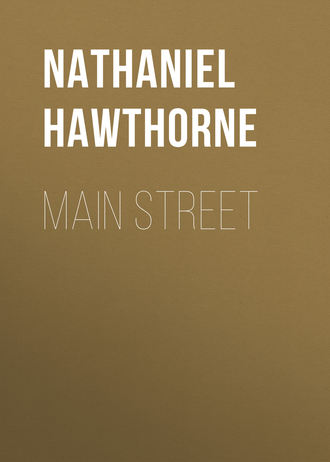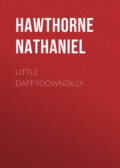
Натаниель Готорн
Main Street
Farther down the street, we see Emanuel Downing, a grave and worthy citizen, with his son George, a stripling who has a career before him; his shrewd and quick capacity and pliant conscience shall not only exalt him high, but secure him from a downfall. Here is another figure, on whose characteristic make and expressive action I will stake the credit of my pictorial puppet-show.
Have you not already detected a quaint, sly humor in that face,—an eccentricity in the manner,—a certain indescribable waywardness,—all the marks, in short, of an original man, unmistakably impressed, yet kept down by a sense of clerical restraint? That is Nathaniel Ward, the minister of Ipswich, but better remembered as the simple cobbler of Agawam. He hammered his sole so faithfully, and stitched his upper-leather so well, that the shoe is hardly yet worn out, though thrown aside for some two centuries past. And next, among these Puritans and Roundheads, we observe the very model of a Cavalier, with the curling lovelock, the fantastically trimmed beard, the embroidery, the ornamented rapier, the gilded dagger, and all other foppishnesses that distinguished the wild gallants who rode headlong to their overthrow in the cause of King Charles. This is Morton of Merry Mount, who has come hither to hold a council with Endicott, but will shortly be his prisoner. Yonder pale, decaying figure of a white-robed woman, who glides slowly along the street, is the Lady Arabella, looking for her own grave in the virgin soil. That other female form, who seems to be talking—we might almost say preaching or expounding—in the centre of a group of profoundly attentive auditors, is Ann Hutchinson. And here comes Vane—
“But, my dear sir,” interrupts the same gentleman who before questioned the showman’s genealogical accuracy, “allow me to observe that these historical personages could not possibly have met together in the Main Street. They might, and probably did, all visit our old town, at one time or another, but not simultaneously; and you have fallen into anachronisms that I positively shudder to think of!”
“The fellow,” adds the scarcely civil critic, “has learned a bead-roll of historic names, whom he lugs into his pictorial puppet-show, as he calls it, helter-skelter, without caring whether they were contemporaries or not,—and sets them all by the ears together. But was there ever such a fund of impudence? To hear his running commentary, you would suppose that these miserable slips of painted pasteboard, with hardly the remotest outlines of the human figure, had all the character and expression of Michael Angele’s pictures. Well! go on, sir!”
“Sir, you break the illusion of the scene,” mildly remonstrates the showman.
“Illusion! What illusion?” rejoins the critic, with a contemptuous snort. “On the word of a gentleman, I see nothing illusive in the wretchedly bedaubed sheet of canvas that forms your background, or in these pasteboard slips that hitch and jerk along the front. The only illusion, permit me to say, is in the puppet-showman’s tongue,—and that but a wretched one, into the bargain!”
“We public men,” replies the showman, meekly, “must lay our account, sometimes, to meet an uncandid severity of criticism. But—merely for your own pleasure, sir—let me entreat you to take another point of view. Sit farther back, by that young lady, in whose face I have watched the reflection of every changing scene; only oblige me by sitting there; and, take my word for it, the slips of pasteboard shall assume spiritual life, and the bedaubed canvas become an airy and changeable reflex of what it purports to represent.”
“I know better,” retorts the critic, settling himself in his seat, with sullen but self-complacent immovableness. “And, as for my own pleasure, I shall best consult it by remaining precisely where I am.”
The showman bows, and waves his hand; and, at the signal, as if time and vicissitude had been awaiting his permission to move onward, the mimic street becomes alive again.
Years have rolled over our scene, and converted the forest-track into a dusty thoroughfare, which, being intersected with lanes and cross-paths, may fairly be designated as the Main Street. On the ground-sites of many of the log-built sheds, into which the first settlers crept for shelter, houses of quaint architecture have now risen. These later edifices are built, as you see, in one generally accordant style, though with such subordinate variety as keeps the beholder’s curiosity excited, and causes each structure, like its owner’s character, to produce its own peculiar impression. Most of them have a huge chimney in the centre, with flues so vast that it must have been easy for the witches to fly out of them as they were wont to do, when bound on an aerial visit to the Black Man in the forest. Around this great chimney the wooden house clusters itself, in a whole community of gable-ends, each ascending into its own karate peak; the second story, with its lattice-windows, projecting over the first; and the door, which is perhaps arched, provided on the outside with an iron hammer, wherewith the visitor’s hand may give a thundering rat-a-tat.
The timber framework of these houses, as compared with those of recent date, is like the skeleton of an old giant, beside the frail bones of a modern man of fashion. Many of them, by the vast strength and soundness of their oaken substance, have been preserved through a length of time which would have tried the stability of brick and stone; so that, in all the progressive decay and continual reconstruction of the street, down our own days, we shall still behold these old edifices occupying their long-accustomed sites. For instance, on the upper corner of that green lane which shall hereafter be North Street, we see the Curwen House, newly built, with the carpenters still at work on the roof nailing down the last sheaf of shingles. On the lower corner stands another dwelling,—destined, at some period of its existence, to be the abode of an unsuccessful alchemist,—which shall likewise survive to our own generation, and perhaps long outlive it. Thus, through the medium of these patriarchal edifices, we have now established a sort of kindred and hereditary acquaintance with the Main Street.
Great as is the transformation produced by a short term of years, each single day creeps through the Puritan settlement sluggishly enough. It shall pass before your eyes, condensed into the space of a few moments. The gray light of early morning is slowly diffusing itself over the scene; and the bellman, whose office it is to cry the hour at the street-corners, rings the last peal upon his hand bell, and goes wearily homewards, with the owls, the bats, and other creatures of the night. Lattices are thrust back on their hinges, as if the town were opening its eyes, in the summer morning. Forth stumbles the still drowsy cowherd, with his horn; putting which to his lips, it emits a bellowing bray, impossible to be represented in the picture, but which reaches the pricked-up ears of every cow in the settlement, and tells her that the dewy pasture-hour is come. House after house awakes, and sends the smoke up curling from its chimney, like frosty breath from living nostrils; and as those white wreaths of smoke, though impregnated with earthy admixtures, climb skyward, so, from each dwelling, does the morning worship—its spiritual essence, bearing up its human imperfection—find its way to the heavenly Father’s throne.
The breakfast-hour being passed, the inhabitants do not, as usual, go to their fields or workshops, but remain within doors; or perhaps walk the street, with a grave sobriety, yet a disengaged and unburdened aspect, that belongs neither to a holiday nor a Sabbath. And, indeed, this passing day is neither, nor is it a common week-day, although partaking of all the three. It is the Thursday Lecture; an institution which New England has long ago relinquished, and almost forgotten, yet which it would have been better to retain, as bearing relations to both the spiritual and ordinary life, and bringing each acquainted with the other. The tokens of its observance, however, which here meet our eyes, are of rather a questionable cast. It is, in one sense, a day of public shame; the day on which transgressors, who have made themselves liable to the minor severities of the Puritan law receive their reward of ignominy. At this very moment, this constable has bound an idle fellow to the whipping-post, and is giving him his deserts with a cat-o’-nine tails. Ever since sunrise, Daniel Fairfield has been standing on the steps of the meeting-house, with a halter about his neck, which he is condemned to wear visibly throughout his lifetime; Dorothy Talby is chained to a post at the corner of Prison Lane, with the hot sun blazing on her matronly face, and all for no other offence than lifting her hand against her husband; while, through the bars of that great wooden cage, in the centre of the scene, we discern either a human being or a wild beast, or both in one, whom this public infamy causes to roar, and gnash his teeth, and shake the strong oaken bars, as if he would breakforth, and tear in pieces the little children who have been peeping at him. Such are the profitable sights that serve the good people to while away the earlier part of lecture-day. Betimes in the forenoon, a traveller—the first traveller that has come hitherward this morning-rides slowly into the street on his patient steed. He seems a clergyman; and, as he draws near, we recognize the minister of Lynn, who was pre-engaged to lecture here, and has been revolving his discourse, as he rode through the hoary wilderness. Behold, now, the whole town thronging into the meeting-house, mostly with such sombre visages that the sunshine becomes little better than a shadow when it falls upon them. There go the Thirteen Men, grim rulers of a grim community! There goes John Massey, the first town-born child, now a youth of twenty, whose eye wanders with peculiar interest towards that buxom damsel who comes up the steps at the same instant. There hobbles Goody Foster, a sour and bitter old beldam, looking as if she went to curse, and not to pray, and whom many of her neighbors suspect of taking an occasional airing on a broomstick. There, too, slinking shamefacedly in, you observe that same poor do-nothing and good-for-nothing whom we saw castigated just now at the whipping-post. Last of all, there goes the tithing-man, lugging in a couple of small boys, whom he has caught at play beneath God’s blessed sunshine, in a back lane. What native of Naumkeag, whose recollections go back more than thirty years, does not still shudder at that dark ogre of his infancy, who perhaps had long ceased to have an actual existence, but still lived in his childish belief, in a horrible idea, and in the nurse’s threat, as the Tidy Man!
It will be hardly worth our while to wait two, or it may be three, turnings of the hour-glass, for the conclusion of the lecture. Therefore, by my control over light and darkness, I cause the dusk, and then the starless night, to brood over the street; and summon forth again the bellman, with his lantern casting a gleam about his footsteps, to pace wearily from corner to corner, and shout drowsily the hour to drowsy or dreaming ears. Happy are we, if for nothing else, yet because we did not live in those days. In truth, when the first novelty and stir of spirit had subsided,—when the new settlement, between the forest-border and the sea, had become actually a little town,—its daily life must have trudged onward with hardly anything to diversify and enliven it, while also its rigidity could not fail to cause miserable distortions of the moral nature. Such a life was sinister to the intellect, and sinister to the heart; especially when one generation had bequeathed its religious gloom, and the counterfeit of its religious ardor, to the next; for these characteristics, as was inevitable, assumed the form both of hypocrisy and exaggeration, by being inherited from the example and precept of other human beings, and not from an original and spiritual source. The sons and grandchildren of the first settlers were a race of lower and narrower souls than their progenitors had been. The latter were stern, severe, intolerant, but not superstitious, not even fanatical; and endowed, if any men of that age were, with a far-seeing worldly sagacity. But it was impossible for the succeeding race to grow up, in heaven’s freedom, beneath the discipline which their gloomy energy of character had established; nor, it may be, have we even yet thrown off all the unfavorable influences which, among many good ones, were bequeathed to us by our Puritan forefathers. Let us thank God for having given us such ancestors; and let each successive generation thank him, not less fervently, for being one step further from them in the march of ages.







